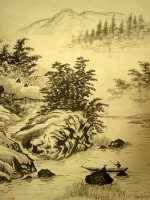Been busy working on the hinoki
+15
Cullen Wegman
my nellie
carlos
mr treevolution
Kev Bailey
Ed van der Reek
fiona
Hombre
coh
Russell Coker
BrianG
LSBonsai
GemMoses
AdamG
marcus watts
19 posters
Page 1 of 1
 Been busy working on the hinoki
Been busy working on the hinoki
hi,
after the initial styling and wiring of my Hinoki Cypress I was getting a few hints from Ed and he was kind enough to do a virt with a hollowed trunk. I had been lowering and rounding the crown from the original pointed top and decided to take a deep breath and carve the trunk out. I started off with hand carving tools to remove most of the wood, then cleaned it up with a stone type file attached to a dremel, finishing off with a blow torch to burn off the little fibres.
Once the wood dried i applied lime sulphar, then acrylic black ink to the deepest carving, watered ink to the 'higher' areas and a little white acrylic to the high points.
as this was drying out i took all the wire off, rewired every branch and removed some of the wider branches completely. This has taken the tree from a young looking specimen to a much older looking tree - Thanks to ed for the original virt as it was done so well it was easy to see how the tree would benifit from the aging.
First styling:

And the tree today:

after the initial styling and wiring of my Hinoki Cypress I was getting a few hints from Ed and he was kind enough to do a virt with a hollowed trunk. I had been lowering and rounding the crown from the original pointed top and decided to take a deep breath and carve the trunk out. I started off with hand carving tools to remove most of the wood, then cleaned it up with a stone type file attached to a dremel, finishing off with a blow torch to burn off the little fibres.
Once the wood dried i applied lime sulphar, then acrylic black ink to the deepest carving, watered ink to the 'higher' areas and a little white acrylic to the high points.
as this was drying out i took all the wire off, rewired every branch and removed some of the wider branches completely. This has taken the tree from a young looking specimen to a much older looking tree - Thanks to ed for the original virt as it was done so well it was easy to see how the tree would benifit from the aging.
First styling:

And the tree today:


marcus watts- Member
 Re: Been busy working on the hinoki
Re: Been busy working on the hinoki
This is a stunning hinoki.
However, I am not convinced the carving was necessary.
However, I am not convinced the carving was necessary.
LSBonsai- Member
 Re: Been busy working on the hinoki
Re: Been busy working on the hinoki
Wow the new apex and touches of reworked branches made a dramatic difference.. made a beautiful Hinoki into an beautiful Old looking Hinoki .. I would love to have this tree.

BrianG- Member
 Re: Been busy working on the hinoki
Re: Been busy working on the hinoki
a2khalid wrote:This is a stunning hinoki.
However, I am not convinced the carving was necessary.
I second those thoughts.

Russell Coker- Member
 Re: Been busy working on the hinoki
Re: Been busy working on the hinoki
Don't mean to pile on, but I feel the same way about the carving. Maybe time will prove it to be a good decision as it ages, but I really liked the trunk as it was - along with the other changes you made. Overall a beautiful tree - makes me want to get a hinoki. Of course, every nice tree does that! But I guess everyone else knows what that is like...
Chris
Chris

coh- Member
 Re: Been busy working on the hinoki
Re: Been busy working on the hinoki
The thinned out canopy has really enhanced what was already a superb tree. One in the eye for those who say hinoki are difficult to make good.
I certainly don't dislike the carving, but I think on balance I preferred the "plain" bark. I've emphasised "plain" because IMHO it was anything but. It'll be interesting to see how it looks when the newness of the lime sulphur and ink has weathered a bit.
Once you'd taken that deep breath, did you consider continue the carving higher up the trunk? Not necessarily as one continuous shari, but with additional narrower bits higher up
I certainly don't dislike the carving, but I think on balance I preferred the "plain" bark. I've emphasised "plain" because IMHO it was anything but. It'll be interesting to see how it looks when the newness of the lime sulphur and ink has weathered a bit.
Once you'd taken that deep breath, did you consider continue the carving higher up the trunk? Not necessarily as one continuous shari, but with additional narrower bits higher up

fiona- Member
 Re: Been busy working on the hinoki
Re: Been busy working on the hinoki
Hi Marcus,nice to see that you create the tree like the virtual I made for you.
Only the tree have to develop more growth in the middle,and it will totally looks much better.
Maybe you can post the virtual I made for you,this can be realised in two years with the proper feeding and trimming-method
I really like this species
O,and Fiona I like your Pinus parviflora that was on the BSA]Like it was shown in the Bonsai Focus nr 103 ]
]
Gr Ed
Only the tree have to develop more growth in the middle,and it will totally looks much better.
Maybe you can post the virtual I made for you,this can be realised in two years with the proper feeding and trimming-method
I really like this species

O,and Fiona I like your Pinus parviflora that was on the BSA]Like it was shown in the Bonsai Focus nr 103
 ]
]Gr Ed

Ed van der Reek- Member
 Re: Been busy working on the hinoki
Re: Been busy working on the hinoki
hi,
carving a tree, adding dead wood etc is always a personal thing, and once done will always need more time to mature and look convincing than the instant image you can create when wiring and bending ever-green foliage.
I find newly carved living wood never looks particularly good but you have to make a start somewhere so it can dry and mature - (then i can sand blast it to reveal the grain ) and the wood needs to grey naturally over the next few winters.
it was very interesting, the previous owner of the tree (for 17 years) popped round last week...........he was absolutely amazed with the transformation and loved it more than any other tree I have.....it was with a little trepidation i must admit that i took him into the garden ! but he just sat and smiled in front of the tree, happy the tree had moved on to a path to a more mature stage. phew !
thanks Ed, yes it was a wonderful virt and as you say, the next few years work will achieve the complete image and people need to remember this is the first day of this trees new look. i'm glad people are enjoying seeing the species used - yes hinoki is a wonderful species to work on. Because it needs a few years to achieve a worthy tree i can see how they often get dismissed though, especially as a juniper can be thinned, wired and bent so quickly to look good in photos.
here is the virt made by Ed that showed me thart this was the right choice for my tree in the long term

carving a tree, adding dead wood etc is always a personal thing, and once done will always need more time to mature and look convincing than the instant image you can create when wiring and bending ever-green foliage.
I find newly carved living wood never looks particularly good but you have to make a start somewhere so it can dry and mature - (then i can sand blast it to reveal the grain ) and the wood needs to grey naturally over the next few winters.
it was very interesting, the previous owner of the tree (for 17 years) popped round last week...........he was absolutely amazed with the transformation and loved it more than any other tree I have.....it was with a little trepidation i must admit that i took him into the garden ! but he just sat and smiled in front of the tree, happy the tree had moved on to a path to a more mature stage. phew !
thanks Ed, yes it was a wonderful virt and as you say, the next few years work will achieve the complete image and people need to remember this is the first day of this trees new look. i'm glad people are enjoying seeing the species used - yes hinoki is a wonderful species to work on. Because it needs a few years to achieve a worthy tree i can see how they often get dismissed though, especially as a juniper can be thinned, wired and bent so quickly to look good in photos.
here is the virt made by Ed that showed me thart this was the right choice for my tree in the long term


marcus watts- Member
 Re: Been busy working on the hinoki
Re: Been busy working on the hinoki
If that vert can be pulled off, I'd agree. Time and great skill required though.

Kev Bailey- Admin
 Re: Been busy working on the hinoki
Re: Been busy working on the hinoki
Russell Coker wrote:a2khalid wrote:This is a stunning hinoki.
However, I am not convinced the carving was necessary.
I second those thoughts.
I third those thoughts.
...as the tree trunk is slim, creating a deadwood- dead center would not match the image of a natural growing wild tree with natural deadwood. deadwood I believe should be done to imitate the trees struggle to survive. usually from the base of the tree where new trunk seems to grow from what was left in the living part, from the top of the canopy where a lightning must have struck, a separate dead twin trunk, a huge branch that died back, unless of course if it is a twisted juniper. Then there is an issue of the triangular form of canopy which represents a young tree therefore not much struggle in life exist ,thus, it will contradict the deadwood feature of an older looking tree.
IMHO deadwood is not suitable to all designs, it can either make it or break it.
Well, its just my opinion.
As the deadwood is already there, may I suggest a less fuller canopy with lesser branch, With a not too obvious triangular shape. I think it will make the tree looks much older in the future. again, just an opinion.
regards,
jun
Guest- Guest
 Re: Been busy working on the hinoki
Re: Been busy working on the hinoki
I think the deadwood was well done and it will certainly improve over the years as it is refined and matures - so nice work on the carving. But overall I think the best feature of the tree was its quiet, elegant simplicity.
LSBonsai- Member
 Re: Been busy working on the hinoki
Re: Been busy working on the hinoki
I wouldnt have touched that trunk, carving is out of place on this tree as it is on many bonsai.
The tree needs to be created with open airy spaces and less of a tight triangular head.
The mature image of this tree would be conveyed better, with a larger spreading canopy and flatter apex, like a mature Cedrus for example.
I hope the carving does mature well and begins to fit, time will tell. Also hope that the roots below the carving survive!
Just my Welsh 2 Groats worth.
Regards Nick
The tree needs to be created with open airy spaces and less of a tight triangular head.
The mature image of this tree would be conveyed better, with a larger spreading canopy and flatter apex, like a mature Cedrus for example.
I hope the carving does mature well and begins to fit, time will tell. Also hope that the roots below the carving survive!
Just my Welsh 2 Groats worth.
Regards Nick
mr treevolution- Member
 Re: Been busy working on the hinoki
Re: Been busy working on the hinoki
The tree looked much older before;dignified. Now,..........not so beautiful......
carlos- Member
 Re: Been busy working on the hinoki
Re: Been busy working on the hinoki
Does hinoki cypress relate to thuja?
One question though provided that the foliage is fan-like scaly leaves like those of thuja :
Do you let the "scale fans" to grow with their vertical habit or do you wire them flat?
I think the second is too time consuming procedure.... Does this really have any good results?
I do agree with Fiona.fiona wrote:... ... One in the eye for those who say hinoki are difficult to make good.... ...
One question though provided that the foliage is fan-like scaly leaves like those of thuja :
Do you let the "scale fans" to grow with their vertical habit or do you wire them flat?
I think the second is too time consuming procedure.... Does this really have any good results?

my nellie- Member
 Re: Been busy working on the hinoki
Re: Been busy working on the hinoki
my nellie wrote:
One question though provided that the foliage is fan-like scaly leaves like those of thuja :
Do you let the "scale fans" to grow with their vertical habit or do you wire them flat?
I think the second is too time consuming procedure.... Does this really have any good results?
you dont need to wire too many of the fans flat - you pinch off the ones that grow upwards and just keep the ones that grow flatter - over time you get more and more flat ones on the tree - i find that many commonly found garden center dwarf varieties grow with far more verticle fans than the standard forestry tree though, although they do have finer denser foliage and can look better as small bonsai.
On your final point ...........many things in bonsai are time consuming procedures - really good trees dont come from taking short cuts - anyone can wire up a tangle of branches on a pine or juniper and criss cross them all over the place over a few hours to make a tree look nice in a picture - but these trees are always disapointing when you see them in real life. We need to be carefull not to think everything can be done quickly - bonsai demo mentality does not make good long term trees very often - its why the japanese trees are still much better when you see the branch structure that lies under the foliage, and it is these that we should get inspiration from, even though there is often 5-10 years work to achieve the result

marcus watts- Member
 Re: Been busy working on the hinoki
Re: Been busy working on the hinoki
I think I would shorten the branches of this tree to give it a narrower appearance. This would help enhance the look of its age by adding emphasis to its height. Further more this tree gives me the impression that it stands in a great ancient forest and a narrow canopy would be more natural in that regard. As others have also stated I think it looked better before the carving but perhaps only time will tell.
It is already a great specimen but I can picture it being even better.
It is already a great specimen but I can picture it being even better.

Cullen Wegman- Member
 Re: Been busy working on the hinoki
Re: Been busy working on the hinoki
Hi Marcus
i like what you have done to the tree will you be extending the carving any further up the trunk?
regards Dave
i like what you have done to the tree will you be extending the carving any further up the trunk?
regards Dave

dave steventon- Member
 Re: Been busy working on the hinoki
Re: Been busy working on the hinoki
Hello Marcus,
Congratulations on being bold and taking action to correct what you saw as a fault in your tree!
Many of us have lots of common looking trees in our gardens that look very similar to everything out there and we stick with them eventhough we are convinced that there is something we don´t like about them. In the end, because of not taking action, we end up wasting valuable years in our trees´development (future collection pieces can only be obtained if we take drastic moves now).
Now, here´s my feedback on the outcome and things you might want to consider for future work you give to the tree -->
In my opinion, carving deadwood from scratch is a very challenging technique as you must be very careful to ensure that the results look as natural as possible (be it that the tree was knocked over by a passing elephant, hit by lightning, survived a forest fire, had wild animals sharpen claws on its bark, etc...). As we recreate this, it is important to avoid the repetition of equal patterns over and over again (straight lines, identical/perfect curves, equal shaped/sized holes, etc...). These end up looking false as it won´t feel like it could have happened in nature.
It is important to also create a feeling of texture in the direction of the grain. Over time with the deadwood getting wet, then dry, then wet, then dry, it will also contract, expand, contract, expand... As this happens, you will slowly start noticing cracks and lines appearing showing the direction of the grains. If all your carving is done in the opposite direction of the grain when these lines start appearing, your tree might look very unnatural. This is why committing to deadwood is a lenghty process that can´t be done in 1 or 2 sittings but rather, several ones performed over time.
Now, taking a look at your tree, I´ll detail out in order this things that bother me from the bottom upwards:

Overall, it looks like you have a very fun tree to work on with alot of opportunities to convert from good to great bonsai. Great job!
Congratulations on being bold and taking action to correct what you saw as a fault in your tree!
Many of us have lots of common looking trees in our gardens that look very similar to everything out there and we stick with them eventhough we are convinced that there is something we don´t like about them. In the end, because of not taking action, we end up wasting valuable years in our trees´development (future collection pieces can only be obtained if we take drastic moves now).
Now, here´s my feedback on the outcome and things you might want to consider for future work you give to the tree -->
In my opinion, carving deadwood from scratch is a very challenging technique as you must be very careful to ensure that the results look as natural as possible (be it that the tree was knocked over by a passing elephant, hit by lightning, survived a forest fire, had wild animals sharpen claws on its bark, etc...). As we recreate this, it is important to avoid the repetition of equal patterns over and over again (straight lines, identical/perfect curves, equal shaped/sized holes, etc...). These end up looking false as it won´t feel like it could have happened in nature.
It is important to also create a feeling of texture in the direction of the grain. Over time with the deadwood getting wet, then dry, then wet, then dry, it will also contract, expand, contract, expand... As this happens, you will slowly start noticing cracks and lines appearing showing the direction of the grains. If all your carving is done in the opposite direction of the grain when these lines start appearing, your tree might look very unnatural. This is why committing to deadwood is a lenghty process that can´t be done in 1 or 2 sittings but rather, several ones performed over time.
Now, taking a look at your tree, I´ll detail out in order this things that bother me from the bottom upwards:

- You have great nebari, it is radial, and shows a slight bell shape going upwards.
- I like the start of the trunk, the wringled bark on the right, and how the shari follows the direction of a root while giving great initial movement to the composition.
- This movement sadly comes to an immediate halt and lasts throughout the entire midsection of the trunk (the same feeling was still evoked before the shari was created). The carvings look very straight (red lines), killing the movement and flow of eyesight and looking somewhat unnatural. This is something that needs to be perfected over time.
- The ink needs to be rethought over time to give it a more natural feel. Black ink is used to give more depth to the rotting wood; in this case however, it looks like a superficial stain.
- What happenes with the first branch that goes upwards on the left side? I get the feeling that it shoots up with very subtle movement and then dissappears in the foliage.
- The second branch on the right is thicker than the branch below it on the same side.
- The third branch on the right side seems to be almost at the same level as the branch on the left side, and this is accentuated by the empty space above both branches, which is greater than other spaces in the foliage. This also brings greater attention at the trunk line in this space which seems very straight.
- I would also try to wire and bring forward the branch in the final red circle, trying to make the apex denser. Like this it will also hide that straight branch.
Overall, it looks like you have a very fun tree to work on with alot of opportunities to convert from good to great bonsai. Great job!

AK_Panama- Member
 Re: Been busy working on the hinoki
Re: Been busy working on the hinoki
Thank you very much for your response, Marcus!
I appreciate your time to emphasize these simple but prominent points which can help a beginner like me, especially the second part.
This is the essence of my point, why apply some methods that look like they grant a quick effect and not turn to other techniques that are more “respectful” on the tree and have the patience to wait soberly for the results to come after time, see “clip & grow” as an example.
I appreciate your time to emphasize these simple but prominent points which can help a beginner like me, especially the second part.
So, this is a matter of cultivars and varieties you think?marcus watts wrote:… … i find that many commonly found garden center dwarf varieties grow with far more verticle fans than the standard forestry tree though, although they do have finer denser foliage and can look better as small bonsai.
I do understand what you say and I do agree completely with you.marcus watts wrote:… … many things in bonsai are time consuming procedures - … … - bonsai demo mentality does not make good long term trees very often - its why the japanese trees are still much better when you see the branch structure that lies under the foliage, and it is these that we should get inspiration from, even though there is often 5-10 years work to achieve the result
This is the essence of my point, why apply some methods that look like they grant a quick effect and not turn to other techniques that are more “respectful” on the tree and have the patience to wait soberly for the results to come after time, see “clip & grow” as an example.

my nellie- Member
 Similar topics
Similar topics» Another Busy Dragon day
» Hinoki Cypress
» Ms. Santa was busy too
» Busy day at the Dragon workshop
» The Dragons have been busy over Christmas
» Hinoki Cypress
» Ms. Santa was busy too
» Busy day at the Dragon workshop
» The Dragons have been busy over Christmas
Page 1 of 1
Permissions in this forum:
You cannot reply to topics in this forum








